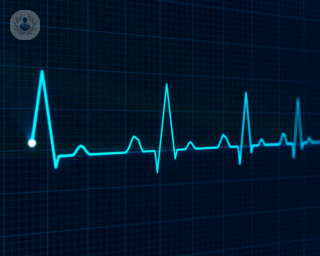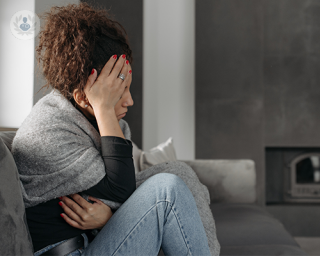What is syncope?
Syncope, also known as fainting, is the sudden loss of consciousness for a brief period. This is usually caused by insufficient blood flow to the brain, and is often associated with low blood pressure (hypotension).

What are the symptoms of syncope?
Before fainting, you may feel weakness or nausea. The following are also warning signs experienced just before fainting:
- Feeling clammy and sweaty
- Confusion
- Light-headedness
- Blurred vision
- Yawning
- Ringing in your ears
After fainting, you normally regain consciousness within 20 seconds, and you may feel weak for a short period afterwards. You may also not remember what you were doing just before you fainted.
What causes syncope?
Fainting (syncope) is caused by a reduction in blood flow to the brain. This can be disrupted by several factors:
- Triggers (e.g. heat, pain, sitting or standing up suddenly, an unpleasant sight or even swallowing)
- Heart problems
- Reflex anoxic seizures (common in children)
- Low blood pressure (hypotension)
- Low blood sugar levels
- Medications
- Dehydration
Can syncope be prevented?
There is no specific treatment that prevents the onset of syncope, but if a person is prone to fainting, you can either avoid known triggers, or if you feel an episode coming on, lie down and lift your legs or sit down and put your head between your knees. This keeps blood flowing to your brain.
How is syncope treated?
Treatment depends on the cause of the syncope. If there is an underlying health condition, then tests will need to confirm this and treated accordingly. The tests that the doctor can order can include:
- Blood tests
- Heart rate monitoring
- Echocardiography
- Electrocardiography
- Chest x-ray
Often, after fainting, no further treatment is needed, but measures to avoid future episodes can be taken, such as avoiding triggers.
11-13-2012 07-19-2023Syncope
Dr Alessandro Giardini - Paediatric cardiology
Created on: 11-13-2012
Updated on: 07-19-2023
Edited by: Conor Lynch
What is syncope?
Syncope, also known as fainting, is the sudden loss of consciousness for a brief period. This is usually caused by insufficient blood flow to the brain, and is often associated with low blood pressure (hypotension).

What are the symptoms of syncope?
Before fainting, you may feel weakness or nausea. The following are also warning signs experienced just before fainting:
- Feeling clammy and sweaty
- Confusion
- Light-headedness
- Blurred vision
- Yawning
- Ringing in your ears
After fainting, you normally regain consciousness within 20 seconds, and you may feel weak for a short period afterwards. You may also not remember what you were doing just before you fainted.
What causes syncope?
Fainting (syncope) is caused by a reduction in blood flow to the brain. This can be disrupted by several factors:
- Triggers (e.g. heat, pain, sitting or standing up suddenly, an unpleasant sight or even swallowing)
- Heart problems
- Reflex anoxic seizures (common in children)
- Low blood pressure (hypotension)
- Low blood sugar levels
- Medications
- Dehydration
Can syncope be prevented?
There is no specific treatment that prevents the onset of syncope, but if a person is prone to fainting, you can either avoid known triggers, or if you feel an episode coming on, lie down and lift your legs or sit down and put your head between your knees. This keeps blood flowing to your brain.
How is syncope treated?
Treatment depends on the cause of the syncope. If there is an underlying health condition, then tests will need to confirm this and treated accordingly. The tests that the doctor can order can include:
- Blood tests
- Heart rate monitoring
- Echocardiography
- Electrocardiography
- Chest x-ray
Often, after fainting, no further treatment is needed, but measures to avoid future episodes can be taken, such as avoiding triggers.


What causes someone to suddenly collapse?
By Dr Amanda Varnava
2024-12-21
Collapsing is surprisingly common – at least 1 in 2 people will suffer a collapse at some point in life. We asked leading consultant cardiologist Dr Amanda Varnava what causes someone to collapse and what a GP should do to investigate the problem. See more


Situational syncope: why do we faint under stress?
By Dr Boon Lim
2024-12-21
If you faint at the sight of blood or needles or from standing up for long periods, you are someone that experiences situational syncope. This is temporary loss of consciousness in response to a certain trigger or situation that causes you stress. Award-winning cardiologist, Dr Boon Lim, explains what is happening to our bodies when we faint, how it can be avoided and offers some tips to help you cope when you feel a syncope episode coming on. See more


Blackouts (syncope) explained: possible causes, diagnostic tests and when to see a doctor
By Dr Syed Afzal Sohaib
2024-12-21
About half the UK population experience syncope (a blackout) at least once in their lifetime. Usually, the cause is unrelated to the heart. However, if blackouts are caused by the heart, they usually require urgent medical attention. Mr Azfal Sohaib explains the potential causes, when to see a doctor, and the tests you might undergo. See more


All about vasovagal syncope: fainting explained
By Dr Boon Lim
2024-12-21
Dr Phang Boon Lim explains why people faint and talks about how vasovagal syncope is diagnosed and managed. See more
Experts in Syncope
-
Dr Michael John Van der Watt
CardiologyExpert in:
- Heart murmur
- Palpitations
- Angina
- Syncope
- Heart failure
- Pacemaker
-
Dr Boon Lim
CardiologyExpert in:
- Cardiac (catheter) ablation
- Implantable cardioverter defibrillator (ICD)
- Arrhythmia
- Syncope
- Pacemaker
- Atrial Fibrillation
-
Dr Alessandro Giardini
Paediatric cardiologyExpert in:
- Chest pain
- Heart murmur
- Palpitations
- Syncope
- Echocardiogram
- Congenital heart disease
-
Dr Owen Miller
Paediatric cardiologyExpert in:
- Heart murmur in children
- Echocardiogram
- Palpitations
- Chest pain in children
- Congenital heart disease
- Syncope
-
Dr Mashkur Khan
Internal medicineExpert in:
- Dementia
- Comorbidity
- Syncope
- Fluctuating blood pressure
- Geriatric medicine
- Autoimmune diseases
- See all

The Physicians' Clinic
The Physicians' Clinic
14 Devonshire St, London W1G 7AE
No existe teléfono en el centro.
By using the telephone number provided by TOP DOCTORS, you automatically agree to let us use your phone number for statistical and commercial purposes. For further information, read our Privacy Policy
Top Doctors

One Heart Clinic Reading
One Heart Clinic Reading
Bupa Health and Dental Centre, Centurion Court, Reading RG1 5AS
No existe teléfono en el centro.
By using the telephone number provided by TOP DOCTORS, you automatically agree to let us use your phone number for statistical and commercial purposes. For further information, read our Privacy Policy
Top Doctors

The Wellington Hospital - part of HCA Healthcare
The Wellington Hospital - part of HCA Healthcare
Wellington Hospital South Bldg, 8A Wellington Pl, NW8 9LE
No existe teléfono en el centro.
By using the telephone number provided by TOP DOCTORS, you automatically agree to let us use your phone number for statistical and commercial purposes. For further information, read our Privacy Policy
Top Doctors
-
The Physicians' Clinic
14 Devonshire St, London W1G 7AE, Central LondonExpert in:
- Cardiology
- Dermatology
- Gastroenterology
- Neurology
- Rheumatology
-
One Heart Clinic Reading
Bupa Health and Dental Centre, Centurion Court, Reading RG1 5AS, ReadingExpert in:
- Arrhythmia
- Cardiology
- Preventive cardiology
- Diagnostic Imaging
- Chest pain
- Cardiovascular disease
-
The Wellington Hospital - part of HCA Healthcare
Wellington Hospital South Bldg, 8A Wellington Pl, NW8 9LE, Central LondonExpert in:
- Digestive
- Cardiology
- Orthopaedic surgery
- Orthopaedic spinal surgery
- Intensive care
- Spine
- See all
- Most viewed diseases, medical tests, and treatments
- Alzheimer's disease
- Chronic headache
- Electrophysiology study
- Migraine
- Maternal mental health
- Autoimmune diseases
- Joint pain
- Nutrition
- Genetic testing
- Abdominal pain







